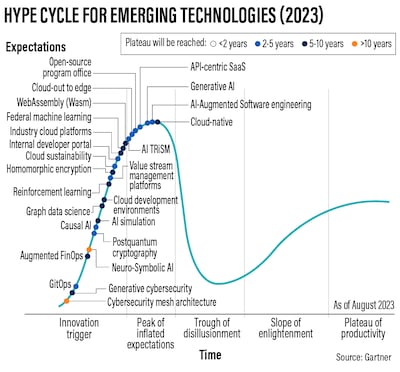US research firm Gartner has termed generative artificial intelligence as overhyped and positioned it at the peak of “inflated expectations” for emerging technology in 2023, close behind AI-augmented software engineering and cloud-native technology.
The sensational technology is leading a trend centred around creating new opportunities for innovation, potentially delivering transformational benefits within the next two to 10 years, Gartner said in its latest Hype Cycle For Emerging Technologies report.
Gartner defines “transformational benefits” as something that “enables new ways of doing business across industries that will result in major shifts in industry dynamics”.
Generative AI, in particular, is expected to deliver these benefits within two to five years before plateauing, a state in which little or no progress is being made after a period of development, Gartner said.

Generative AI is the most prominent among technologies that are riding the current AI wave, all of which have varying degrees of use cases, potential benefits and timelines to deliver benefits, Gartner said.
“Emerging technologies are disruptive by nature, but the competitive advantage they provide isn’t yet well-known or proven,” the report said.
“Most will take more than five years, and some more than 10 years, to reach the plateau of productivity. But some technologies will mature in the near term, so you must understand the opportunities they present.”
Gartner, however, cautioned that significant hype does not equate to guaranteed success for technologies, and urged users to take risks into consideration if and when they choose to implement them.
“Great uncertainty exists about how they will evolve. Such embryonic technologies present greater risks for deployment, but potentially greater benefits for early adopters,” the report said.
AI has long been used by businesses in their operations, but it has gained momentum with the advent of generative AI, made popular by Microsoft-backed Open AI's ChatGPT, which became a sensation as it is capable of producing various kinds of data, including audio, code, images, text, simulations, 3D objects and videos.
Investors put more than $4.2 billion into generative AI start-ups in 2021 and 2022 through 215 deals after interest surged in 2019, recent data from CB Insights showed.
Globally, AI investments are projected to hit $200 billion by 2025 and could possibly have a bigger impact on gross domestic product, Goldman Sachs Economic Research said in a report last week.
That study also indicated that AI investments will possibly take a few years to have a major impact on the economy, rising from a relatively slow starting point.
Its potential is already being flagged in other regional economies. GCC countries, for instance, are expected to reap about $23.5 billion in economic benefits by 2030 as investments in generative AI continue to grow, PwC unit Strategy& Middle East said in a report last month.
The technology could also raise global labour productivity growth by more than one percentage point per year in the next decade, Goldman Sachs said last month.
“While all eyes are on AI right now, CIOs [chief technology officers] and CTOs [chief technology officers] must also turn their attention to other emerging technologies with transformational potential,” said Melissa Davis, a vice president analyst at Gartner.
In addition to generative AI, other emerging AI techniques – AI simulation, causal AI and federated machine learning, among others – are seen to enhance digital customer experiences, business decision making and build sustainable competitive differentiation, the study said.
It also points out that humans will remain the primary cause of security incidents and data breaches, urging enterprises to implement a human-centric security and privacy programme.
“The popularity of many new AI techniques will have a profound impact on business and society,” Arun Chandrasekaran, a distinguished vice president analyst at Gartner, wrote in the report.
“The massive pretraining and scale of AI foundation models, viral adoption of conversational agents and the proliferation of generative AI applications are heralding a new wave of workforce productivity and machine creativity.”


